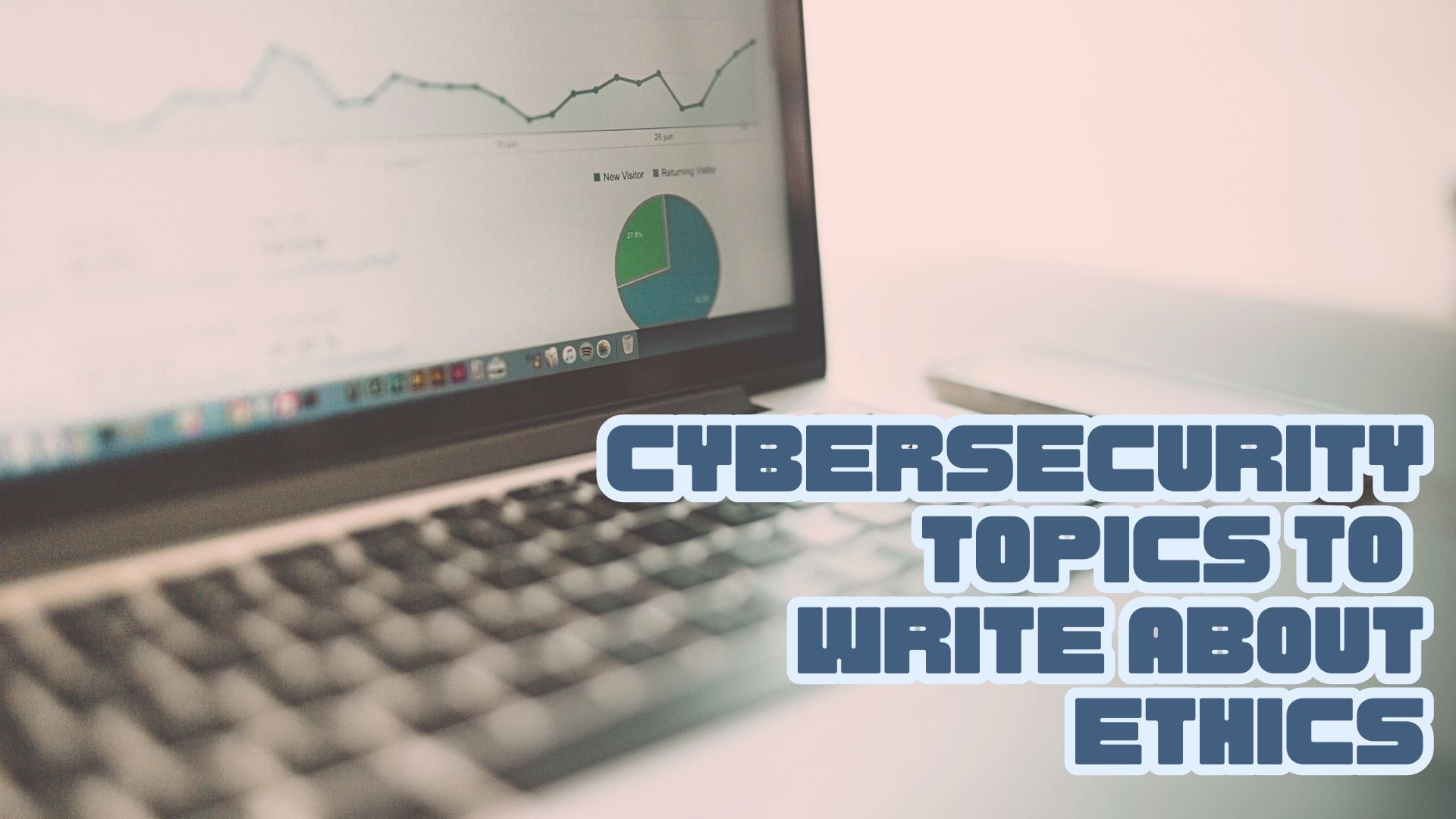204 Current Cybersecurity Topics You Can Use Right Now!

In today’s hyperconnected cyber realm, keeping your digital assets safe and sound from cyber crooks requires some serious code-fu mastery. As the World Wide Web weaves its way into every nook and cranny of modern life, the need for cybersecurity ninjas to thwart hackers’ dastardly plans has reached epic proportions.
This article aims to provide students, security specialists, and cyber geeks with a smorgasbord of fun, interesting, and current cybersecurity topics to get the gray matter juices flowing whether you’re working on an assignment for that demanding professor, an epic research project, or just want to sound smart at the next cybersecurity conference. From hacking human habits and social engineering to the latest zero-day exploits and quantum cryptography, this curated list of great cybersecurity essay topics should keep even the most jaded cybersecurity essay writers and online essay help experts on the edge of their seats
Defining Cybersecurity: What It Is And Why It Is Needed
Cybersecurity involves all the slick hacker-thwarting practices, cutting-edge tech tools, and sneaky security measures used to safeguard computer systems, networks, and data from unauthorized access, cyber-attacks, and and breaches by nefarious cyber criminals.
It involves deploying rock-solid security protocols, identifying vulnerabilities before the bad guys do, and mitigating risks to ensure the confidentiality, integrity, and availability of your digital assets. With the constantly morphing menagerie of cyber threats, cybersecurity ninjas strive to stay one jump ahead of malicious hackers to preserve the safety and privacy of individuals, companies, and entire countries.
Cybersecurity encompasses topics for research like zero-day exploits, social engineering, quantum cryptography, hacking human habits, securing IoT, cloud security, mobile security, network security, application security, securing critical infrastructure, and more – all the great, engaging, and controversial topics today’s top cybersecurity students, security specialists, essay writers and online essay help experts need to know to tackle the most interesting cybersecurity essay, research paper and assignment topics with quality, top grade results on a cheap and secure basis!
Fundamentals Of Cybersecurity
Cybersecurity encompasses the body of technologies, processes, and practices designed to protect networks, computers, programs, and data from damage or unauthorized access. It involves techniques to identify vulnerabilities and threats and mitigate related risks. At its core, cybersecurity is about ensuring the confidentiality, integrity, and availability of digital assets.
- Basics of Cybersecurity: A Foundation for Digital Protection
- Cybersecurity’s Vital Role in the Digital Age
- Encryption: Safeguarding Data in Cybersecurity
- Digital Signatures: Verifying Authenticity in the Digital World
- Firewalls: Fortifying Cybersecurity Defenses
- Antivirus Software: Shielding Against Cyber Threats
- VPNs: Enhancing Security in the Digital Realm
- Managing Cybersecurity Risks: A Comprehensive Approach
- Organizational Cybersecurity Policies: Safeguarding Digital Assets
- Cybersecurity Audits: Assessing Protection Measures
- Frameworks for Cybersecurity: Structuring Defense Strategies
- Cybersecurity Certifications: Validating Expertise
- Training and Awareness: Building a Cybersecurity Culture
- Cybersecurity Insurance: Mitigating Financial Risks
- Cybersecurity’s Impact on Data Privacy
- Safeguarding Intellectual Property with Cybersecurity
- Governance in Cybersecurity: Ensuring Effective Protection
- Cybersecurity’s Role in E-Commerce Security
- Securing the Cloud: Cybersecurity in Cloud Computing
- Building Cybersecurity Resilience: Preparing for Threats
Controversial Topics In Cybersecurity
Cyber threats refer to any person, software, or hardware used to breach cybersecurity defenses to cause harm. Common cyber attacks include malware, phishing, ransomware, distributed denial of service (DDoS), and SQL injection. The most sophisticated attacks are carried out by organized cybercrime groups and nation-state actors seeking to steal data, disrupt systems or achieve political and economic goals.
- Understanding the Concept of Cyber Threats
- Exploring the Role of Malware in Cyber Attacks
- Investigating the Concept of Phishing Attacks
- Gaining Insight into Ransomware Attacks
- Analyzing the Role of Botnets in Cyber Attacks
- Examining the Concept of DDoS Attacks in Cybersecurity
- Understanding the Risks of SQL Injection Attacks
- Evaluating the Role of Zero-Day Exploits in Cyber Attacks
- Unveiling the Concept of Man-in-the-Middle Attacks
- Exploring the Psychology Behind Social Engineering Attacks
- Assessing the Role of Insider Threats in Cyber Attacks
- Investigating the Concept of Advanced Persistent Threats (APTs)
- Understanding the World of Cyber Espionage
- Analyzing the Role of Cyber Warfare in Global Security
- Unraveling the Concept of Cryptojacking
- Examining the Techniques Used in Web Application Attacks
- Assessing the Role of Mobile Malware in Cyber Attacks
- Investigating the Concept of IoT-Based Cyber Attacks
- Understanding the Impact of Cyber Attacks on Critical Infrastructure
- Exploring the Role of AI in Cyber Attacks
Topics In Cyber Security About Online Crime
Cybersecurity topics for research in technologies include firewalls, intrusion detection and prevention systems, antivirus software, identity and access management tools, encryption, data loss prevention, security information, and event management, and security analytics platforms. As threats evolve, new technologies like artificial intelligence, machine learning, and blockchain are being leveraged to enhance cyber defenses.
- Exploring the Role of Artificial Intelligence in Cybersecurity
- Understanding the Concept of Blockchain in Cybersecurity
- Analyzing the Role of Machine Learning in Cybersecurity
- Unveiling the Concept of Quantum Cryptography
- Gaining Insight into the Role of Biometrics in Cybersecurity
- Investigating the Role of Intrusion Detection Systems in Cybersecurity
- Understanding the Concept of Secure Coding
- Evaluating the Role of Honeypots in Cybersecurity
- Examining the Role of Security Information and Event Management (SIEM) Systems
- Unraveling the Concept of Identity and Access Management (IAM)
- Understanding the Role of Endpoint Security
- Assessing the Role of Network Security in Cybersecurity
- Investigating the Concept of Cloud Security
- Analyzing the Role of Mobile Security
- Unveiling the Role of IoT Security in Cybersecurity
- Understanding the Concept of Application Security
- Evaluating the Role of Data Loss Prevention (DLP) Systems
- Investigating the Role of Threat Intelligence in Cybersecurity
- Unraveling the Concept of Cyber Threat Hunting
- Understanding the Role of Cyber Forensics
Cybersecurity Essay Topics About Laws And Regulations
Cybersecurity laws and regulations set minimum security standards and define acceptable use policies to protect digital assets and data privacy. Notable frameworks include the General Data Protection Regulation (GDPR) in Europe, the Health Insurance Portability and Accountability Act (HIPAA) in the U.S., and the Cybersecurity Law in China. Organizations must ensure compliance to avoid hefty fines and reputational damage.
- Decoding Cybersecurity Laws: Navigating the Legal Maze
- GDPR: Data Protection’s Superhero
- The Computer Fraud and Abuse Act (CFAA): Unmasking Cyber Villains
- DMCA: Protecting Digital Creativity in the Cyber Realm
- HIPAA: Safeguarding Healthcare in the Digital Age
- FISMA: Fortifying Federal Information Security
- Sarbanes-Oxley Act: Cybersecurity’s Financial Guardian
- PCI DSS: Securing the Payment Card Industry’s Fort Knox
- CCPA: California’s Shield for Consumer Privacy
- CISA: Sharing Cybersecurity Secrets for a Safer World
- COPPA: Guarding Children’s Online Privacy
- EU Cybersecurity Act: Building Digital Fortresses
- CMMC: Climbing the Ladder to Cybersecurity Excellence
- NIST Cybersecurity Framework: Your Blueprint for Cyber Resilience
- ISO/IEC 27001: Unleashing the Power of Cybersecurity Standards
- Australian Privacy Act: Safeguarding Down Under
- PDPA: Protecting Personal Data in Singapore’s Cyber Landscape
- GDPR: Empowering Data Protection in the EU
- NIS Directive: Safeguarding Networks and Information in the EU
- Cybersecurity Law of the People’s Republic of China: Guarding the Digital Dragon
Securing Industries Cybersecurity Topics
Cybersecurity needs vary significantly by industry due to differences in assets, threats, and regulatory requirements. For example, the finance industry focuses on payment card security and fraud detection, while healthcare prioritizes patient data privacy and medical device security. The government sector deals with state-sponsored cyber espionage and critical infrastructure protection.
- Safeguarding Health: The Vital Role of Cybersecurity in the Healthcare Industry
- Fortifying Finances: Understanding Cybersecurity in the Financial Sector
- Powering Protection: The Role of Cybersecurity in the Energy Sector
- Building Secure Foundations: Exploring Cybersecurity in the Manufacturing Industry
- Securing Shopping: Understanding the Role of Cybersecurity in the Retail Sector
- Educating for Safety: The Crucial Role of Cybersecurity in the Education Sector
- On the Move: Navigating Cybersecurity in the Transportation Industry
- Connecting with Confidence: Understanding Cybersecurity in the Telecommunications Sector
- Defending the Nation: The Role of Cybersecurity in the Defense Sector
- Safeguarding the Public: Exploring Cybersecurity in the Public Sector
- Hospitality’s Shield: Understanding the Role of Cybersecurity in the Hospitality Industry
- Protecting Entertainment: The Crucial Role of Cybersecurity in the Entertainment Industry
- Cultivating Security: The Concept of Cybersecurity in the Agriculture Sector
- Securing Real Estate: Understanding the Role of Cybersecurity in the Real Estate Sector
- Driving Security: The Role of Cybersecurity in the Automotive Industry
- Reaching for the Skies: Exploring Cybersecurity in the Aerospace Industry
- Preserving Health: Understanding the Role of Cybersecurity in the Pharmaceutical Industry
- Food for Thought: The Role of Cybersecurity in the Food and Beverage Industry
- Insuring Protection: The Concept of Cybersecurity in the Insurance Industry
- Constructing Security: Understanding the Role of Cybersecurity in the Construction Industry
Cybersecurity’s Impact On Society
Cybersecurity impacts society on many levels. Data breaches can compromise the privacy of individuals and organizations. Cyber attacks on critical infrastructure threaten public safety and national security. There are also ethical implications regarding data collection, surveillance, and the use of cyber weapons. Society must find a balance between security, privacy, and innovation.
- Guardians of Privacy: The Role of Cybersecurity in Protecting Personal Data
- Balancing Security and Privacy: Understanding the Concept of Cybersecurity and Privacy
- Protecting the Future: The Role of Cybersecurity in Safeguarding Children Online
- Cybersecurity and Human Rights: Preserving Digital Freedoms
- Defending Democracy: Understanding the Role of Cybersecurity in Democratic Processes
- Securing Social Spaces: The Role of Cybersecurity in Social Media
- Unmasking Misinformation: Exploring the Concept of Cybersecurity and Fake News
- Ensuring Trustworthy Elections: Understanding the Role of Cybersecurity in Online Voting
- Safeguarding Digital Wallets: The Role of Cybersecurity in Digital Currencies
- Battling Online Harassment: The Concept of Cybersecurity and Cyberbullying
- Protecting the Gaming Realm: Understanding the Role of Cybersecurity in Online Gaming
- Love in the Digital Age: The Role of Cybersecurity in Online Dating
- Bridging the Digital Divide: Exploring the Concept of Cybersecurity and the Digital Divide
- Empowering Digital Literacy: Understanding the Role of Cybersecurity in Digital Literacy
- Nurturing Digital Citizenship: The Role of Cybersecurity in Promoting Responsible Online Behavior
- Safeguarding Digital Identities: Exploring the Concept of Cybersecurity and Digital Identity
- Ensuring Secure Governance: Understanding the Role of Cybersecurity in E-Governance
- Fueling Digital Economies: The Role of Cybersecurity in Driving Digital Growth
- Diplomacy in the Digital Age: Exploring the Concept of Cybersecurity and Digital Diplomacy
- Preserving Digital Health: Understanding the Role of Cybersecurity in Digital Healthcare
Leadership And Management In An Online World
Effective cybersecurity requires strong management and leadership. Cybersecurity programs must be aligned with business goals, risk appetite, and compliance obligations. Leaders must establish policies, processes, budgets, roles, and responsibilities to implement a comprehensive cybersecurity strategy. They must also foster a security-aware culture and build resilience through training, communication, and incident response planning.
- Leading the Defense: The Role of Leadership in Cybersecurity
- Building a Secure Culture: Understanding the Concept of Cybersecurity Culture
- Strategic Shield: The Role of Cybersecurity in Strategic Planning
- Managing Cyber Risks: Exploring the Concept of Cybersecurity Risk Management
- Ensuring Business Resilience: Understanding the Role of Cybersecurity in Business Continuity Planning
- Rapid Response: The Role of Cybersecurity in Incident Response Planning
- Budgeting for Security: Exploring the Concept of Cybersecurity Budgeting
- Protecting the Human Factor: Understanding the Role of Cybersecurity in Human Resources Management
- Vendor Vetting: The Role of Cybersecurity in Vendor Management
- Securing Project Success: Exploring the Concept of Cybersecurity in Project Management
- Navigating Change: Understanding the Role of Cybersecurity in Change Management
- Governance in the Digital Age: The Role of Cybersecurity in IT Governance
- Service with Security: Exploring the Concept of Cybersecurity in IT Service Management
- Auditing for Protection: Understanding the Role of Cybersecurity in IT Audit
- Operational Resilience: The Role of Cybersecurity in IT Operations Management
- Safeguarding Digital Assets: Exploring the Concept of Cybersecurity in Asset Management
- Quality Assurance in Security: Understanding the Role of Cybersecurity in IT Quality Management
- Managing Performance with Security: The Role of Cybersecurity in IT Performance Management
- Balancing Risk and Portfolio: Exploring the Concept of Cybersecurity in IT Portfolio Management
- Procuring Security: Understanding the Role of Cybersecurity in IT Procurement Management

Cybersecurity Topics To Write About Ethics
Cybersecurity ethics deals with the moral principles that govern the use of digital technologies and data. Key issues include the responsible disclosure of vulnerabilities, the use of deception in security testing, employee monitoring, and the development of autonomous cyber weapons. Ethical hackers adhere to a code of conduct that balances security needs with human rights and societal well-being.
- Ethical Compass: Understanding the Concept of Ethics in Cybersecurity
- White Hat Warriors: The Role of Ethical Hacking in Cybersecurity
- Privacy’s Moral Code: The Concept of Privacy Ethics in Cybersecurity
- Upholding Professionalism: Understanding the Role of Professional Ethics in Cybersecurity
- Ethical Foundations: The Role of Corporate Ethics in Cybersecurity
- Navigating Moral Quandaries: Exploring the Concept of Ethical Dilemmas in Cybersecurity
- Educating for Ethical Practices: Understanding the Role of Ethics in Cybersecurity Education
- Researching with Integrity: The Role of Ethics in Cybersecurity Research
- Balancing Ethics and Policy: The Concept of Ethics in Cybersecurity Law and Policy
- Ethical Innovations: Understanding the Role of Ethics in Cybersecurity Technology
- Leading with Integrity: The Role of Ethics in Cybersecurity Management
- Ethical Operations: Exploring the Concept of Ethics in Cybersecurity Operations
- Responding with Integrity: Understanding the Role of Ethics in Cybersecurity Incident Response
- Managing Risks Ethically: The Role of Ethics in Cybersecurity Risk Management
- Governing with Principles: The Concept of Ethics in Cybersecurity Governance
- Ethical Guidance: Understanding the Role of Ethics in Cybersecurity Consulting
- Ethical Credentials: The Role of Ethics in Cybersecurity Certification
- Setting the Bar: Exploring the Concept of Ethics in Cybersecurity Standards
- Regulating with Ethics: Understanding the Role of Ethics in Cybersecurity Regulation
- Enforcing Ethical Boundaries: The Role of Ethics in Cybersecurity Enforcement
Careers And Skills For A Secure Future
In-demand cybersecurity careers include security analyst, security engineer, penetration tester, incident responder, security architect, chief information security officer, and ethical hacker. Key skills include technical knowledge of networks, operating systems, and security tools; analytical and problem-solving abilities; communication and interpersonal skills; as well as an aptitude for lifelong learning as threats and technologies evolve rapidly.
- Unraveling Cybersecurity Careers: Understanding the Concept of Cybersecurity Careers
- Certifying Success: The Role of Cybersecurity Certifications in Advancing Your Career
- Building the Skillset: The Concept of Skills Needed for a Cybersecurity Career
- Knowledge is Power: Understanding the Role of Education in Cybersecurity Careers
- Experience Matters: The Role of Experience in Shaping Cybersecurity Careers
- Bridging the Gap: Exploring the Concept of Cybersecurity Internships
- Networking for Success: Understanding the Role of Networking in Cybersecurity Careers
- Guiding Lights: The Role of Mentorship in Nurturing Cybersecurity Careers
- Charting Your Path: The Concept of Career Paths in Cybersecurity
- Roles and Responsibilities: Understanding the Role of Job Roles in Cybersecurity
- Cracking the Code: The Role of Job Interviews in Cybersecurity Careers
- Defining Expectations: The Concept of Job Descriptions in Cybersecurity
- Worth the Investment: Understanding the Role of Job Salaries in Cybersecurity Careers
- Finding Fulfillment: The Role of Job Satisfaction in Cybersecurity Careers
- Balancing Act: The Concept of Job Stress in Cybersecurity
- Avoiding Burnout: Understanding the Role of Job Burnout in Cybersecurity Careers
- Retaining Talent: The Role of Job Turnover in Cybersecurity Careers
- Embracing Diversity: The Concept of Job Diversity in Cybersecurity
- Inclusive Workforce: Understanding the Role of Job Inclusion in Cybersecurity Careers
- Ethical Practices: The Role of Job Ethics in Cybersecurity Careers
Cyber Security Paper Topics
The future of cybersecurity will be shaped by emerging technologies like artificial intelligence, 5G networks, cloud computing, and the Internet of Things. As the attack surface expands, security will need to be built into systems by design. There will be a greater need for automation, threat intelligence sharing, and public-private partnerships. The cybersecurity workforce will need to grow substantially to keep pace with threats.
- Embracing the Unseen: Understanding the Concept of the Future of Cybersecurity
- The Sentinel’s Ally: The Role of Artificial Intelligence in Shaping the Future of Cybersecurity
- Unleashing the Unthinkable: Exploring the Concept of Quantum Computing in the Future of Cybersecurity
- Immutable Defenses: Understanding the Role of Blockchain in Safeguarding the Future of Cybersecurity
- The Fifth Generation Shield: The Role of 5G in Fortifying the Future of Cybersecurity
- Interconnected Security: Unraveling the Concept of IoT in Safeguarding the Future of Cybersecurity
- Navigating the Autonomous Era: Understanding the Role of Autonomous Vehicles in the Future of Cybersecurity
- Securing the Connected Cities: The Role of Smart Cities in Safeguarding the Future of Cybersecurity
- Digital Economy’s Guardians: Exploring the Concept of Digital Currencies in the Future of Cybersecurity
- Augmenting Security: Understanding the Role of Augmented Reality in the Future of Cybersecurity
- Virtual Fortresses: The Role of Virtual Reality in Safeguarding the Future of Cybersecurity
- Learning from the Machines: Unraveling the Concept of Machine Learning in the Future of Cybersecurity
- Harnessing the Data Storm: Understanding the Role of Big Data in Shaping the Future of Cybersecurity
- Cloud’s Protective Veil: The Role of Cloud Computing in Safeguarding the Future of Cybersecurity
- Edge’s Edge: Exploring the Concept of Edge Computing in the Future of Cybersecurity
- Securing the Cyber-Physical Realm: Understanding the Role of Cyber-Physical Systems in the Future of Cybersecurity
- Mirroring Security: The Role of Digital Twins in Safeguarding the Future of Cybersecurity
- The Battlefield Evolves: Exploring the Concept of Cyber Warfare in the Future of Cybersecurity
- Diplomacy in the Digital Age: Understanding the Role of Cyber Diplomacy in Shaping the Future of Cybersecurity
- Ensuring the Digital Frontier: The Role of Cyber Insurance in Safeguarding the Future of Cybersecurity
- Resilience in the Face of Threats: Exploring the Concept of Cyber Resilience in the Future of Cybersecurity
- Cultivating Cyber Hygiene: Understanding the Role of Cyber Hygiene in Safeguarding the Future of Cybersecurity
- Empowering Digital Defenders: The Role of Cyber Literacy in Shaping the Future of Cybersecurity
- Defending Digital Borders: Exploring the Concept of Cyber Sovereignty in the Future of Cybersecurity
Get Help With Cybersecurity Assignment
In the end, the most important cybersecurity topic for any student to write about is number 205: How I will apply what I’ve learned to protect the security and privacy of my data, my client’s data, and my company’s data going forward. Because when you get right down to it, the most important cybersecurity starts with you.
The technical topics covered in this article are certainly valuable. But the real test of what students have learned will come when they are faced with real cybersecurity challenges and threats in their future careers. The key is for students to think critically about how the concepts they have studied can be applied proactively and responsibly to secure systems and defend against future attacks. That application of knowledge will be the true measure of their cybersecurity education.
And if you are still struggling you can always get impeccable college homework help. There is nothing bad about seeking out outside assistance, and our experts are here to deal with it! Any cybersecurity question will be answered.
FAQ
What is cybersecurity and why is it needed?
Cybersecurity, including topics suitable for cyber security papers, involves practices and technologies used to protect computer systems, networks, and data from unauthorized access and cyber-attacks. It is important for college and high school students to understand cyber security topics for their academic assignments, and if they don’t they can get computer science homework help. Cybersecurity is needed to ensure the confidentiality, integrity, and availability of digital assets and safeguard individuals, companies, and countries from malicious hackers.
What are some common cyber threats and how can they be prevented?
Some common cyber threats, which can be explored in custom cyber security papers, include malware, phishing, ransomware, DDoS attacks, and SQL injection. To write the best cyber security papers, it is essential to understand preventive measures. These threats can be prevented through measures such as using antivirus software, implementing firewalls, practicing secure coding, employing encryption, and raising awareness about social engineering attacks.
What technologies are used in cybersecurity?
Cybersecurity technologies, a potential topic for cyber security college papers, include firewalls, antivirus software, intrusion detection systems, encryption, identity and access management tools, and security analytics platforms. Emerging technologies like artificial intelligence, machine learning, and blockchain are also being leveraged to enhance cyber defenses. These technologies offer interesting research topics for cyber security papers.
What are some key cybersecurity laws and regulations?
Key cybersecurity laws and regulations, relevant to both college and high school cyber security courses, include the General Data Protection Regulation (GDPR), Health Insurance Portability and Accountability Act (HIPAA), Cybersecurity Law in China, and various industry-specific standards such as Payment Card Industry Data Security Standard (PCI DSS). Compliance with these regulations is crucial to protect digital assets and avoid penalties. These topics can be explored in custom cyber security papers for a comprehensive understanding.












